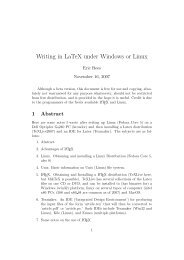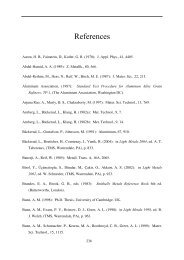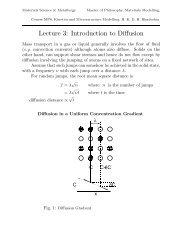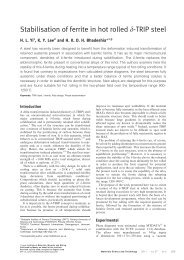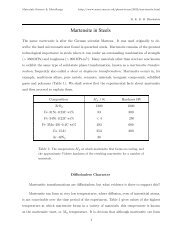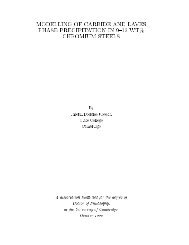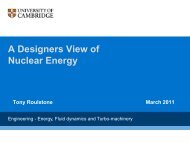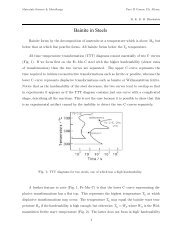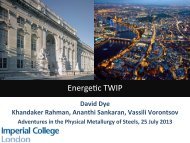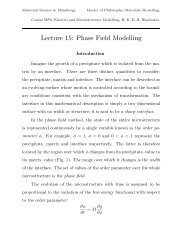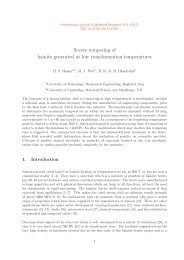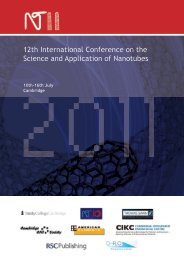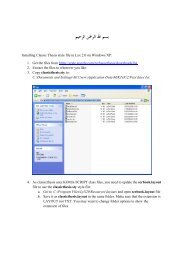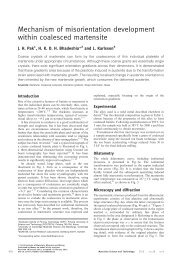Natural Sciences Tripos Part IA - Department of Materials Science ...
Natural Sciences Tripos Part IA - Department of Materials Science ...
Natural Sciences Tripos Part IA - Department of Materials Science ...
Create successful ePaper yourself
Turn your PDF publications into a flip-book with our unique Google optimized e-Paper software.
Relationship to other Courses in <strong>Materials</strong> <strong>Science</strong><strong>Part</strong> <strong>IA</strong> <strong>Part</strong> IB <strong>Part</strong> II <strong>Part</strong> III<strong>Materials</strong> <strong>Science</strong> <strong>Materials</strong> <strong>Science</strong> <strong>Materials</strong> <strong>Science</strong> <strong>Materials</strong> <strong>Science</strong>(BA Hons)(BA Hons MSci)(Earth <strong><strong>Science</strong>s</strong>)(Physics)(Chemistry)(Geological <strong><strong>Science</strong>s</strong>)(Physics)(Chemistry)<strong>Part</strong> <strong>IA</strong> <strong>Materials</strong> <strong>Science</strong> is normally a pre-requisite for students wishing to study for the <strong>Part</strong> IB course in<strong>Materials</strong> <strong>Science</strong>. <strong>Part</strong> IB <strong>Materials</strong> <strong>Science</strong> is commonly combined with Chemistry, Physics, Geological<strong><strong>Science</strong>s</strong> or Mathematics within the <strong>Natural</strong> <strong><strong>Science</strong>s</strong> <strong>Tripos</strong>; however, many other combinations are alsopossible. This course leads on to third (and fourth) year courses in <strong>Materials</strong> <strong>Science</strong>. It is also ideal preparationfor students wishing to specialise in Physics, Chemistry or Geological <strong><strong>Science</strong>s</strong> in later years.Laboratory WorkTimetabled Experiments are run in conjunction with the courses to complement the material taught formally inthe lecture theatre. There is one 2.5 hour afternoon session each week, and you are also expected to carry out afurther 2 hours <strong>of</strong> practical work per week in your own time, which consists <strong>of</strong>:Microscopy An important part <strong>of</strong> the course is to understand the microstructure <strong>of</strong> materials. This is achieved inthe Michaelmas Term through examination <strong>of</strong> materials by optical microscopy and scanning electronmicroscopy. A number <strong>of</strong> prepared specimens are examined and results discussed with your supervisor.Examination <strong>of</strong> a Manufactured Article: the „Artefact Project‟ During the Lent Term you will carry out aninvestigation <strong>of</strong> a manufactured article containing a range <strong>of</strong> different materials. By appropriate sectioning,microscopy and analysis, the materials used are identified and the methods <strong>of</strong> fabrication determined.Industrial VisitsThere will be several visits to companies involved in materials–related industries. Examples <strong>of</strong> recent visitsinclude Hexcel, TWI and Marshall Aerospace.ExaminationsAll students sit two 3-hour theory papers in the Easter Term. The marks from the papers will be added to themarks for the Artefact Project and credit earned for completion <strong>of</strong> the practical course to give a final grade.Contact Details and Further InformationIf you have any queries about the course, please do not hesitate to contact the Head <strong>of</strong> Year, Dr James Elliott(jae1001@cam.ac.uk). The <strong>Department</strong> website hosts information regarding all the undergraduate courses in<strong>Materials</strong> <strong>Science</strong>, please see http://www.msm.cam.ac.uk/Teaching/



